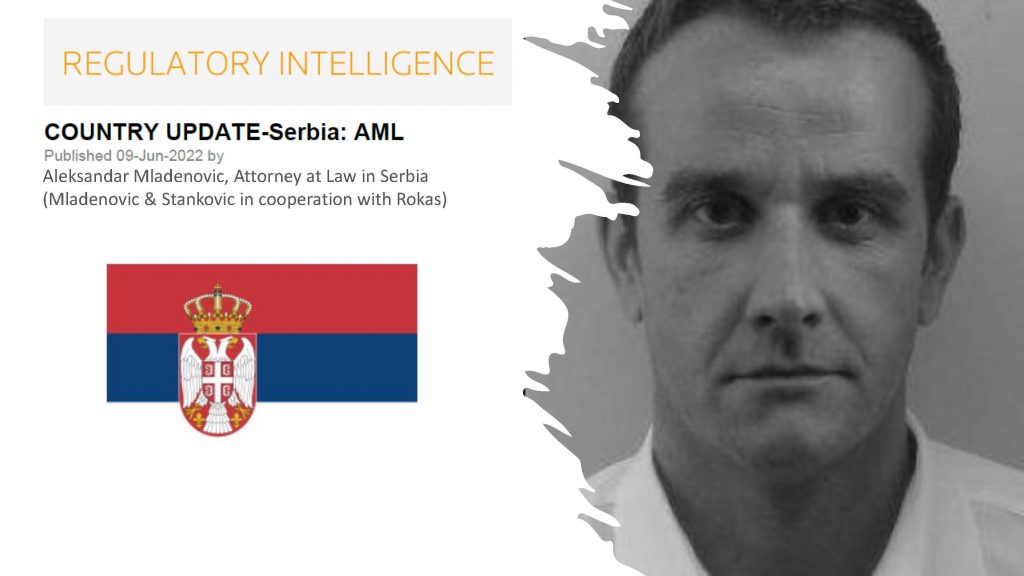(Contribution by Aleksandar Mladenovic, Attorney at Law in Serbia (Mladenovic & Stankovic in cooperation with Rokas), published in Thomson Reuters, Regulatory Intelligence, Country update – Serbia: AML, June 2022)

Legislative framework
The legislative framework in this area is set under the Law for the Prevention of Money Laundering and Terrorism Financing (Official Gazette of RS, no. 113/2017, 91/2019 and 153/2020) (hereinafter “AML/CFT Law” or “Law”) In addition to the above the legislative framework of combating money laundering and financing of terrorism in the Republic of Serbia consists of other laws and by-laws pertaining to other fields and encompassing issues on money laundering and financing of terrorism.
The said laws and regulations refer to definitions of money laundering and terrorism financing; designate reporting entities (the obligors) and explain their obligations; adopt risk based approach requirements for the obligors; describe the procedures and the measures that obligors need to take for customer due diligence (CDD); set out limitations for carrying on business with a customer; describes the conditions under which a reporting agency can conduct simplified or enhanced CDD which are now tailored to a specific situation; define the politically exposed persons and the CDD measures that need to be conducted for these persons; and describe the obligor’s obligation to have in place internal controls of the implementation of obligations and report suspicious transactions and to keep data. Further the money laundering is defined so as to refer to activities such as conversion or transfer of property acquired through the commission of a criminal offense, concealing or misrepresenting the true nature, origin, location, disposition, ownership or right in connection with property acquired through the commission of a criminal offense, acquisition, possession or use of property acquired through the commission of a criminal offense, which may be carried out in the Republic of Serbia and outside its territory.
Amendments to the AML/CFT Law that became applicable on June 30, 2021, extend the scope of application of the law to digital assets (“crypto currencies”) and entities providing transactional services that involve digital assets.
The legal framework is considered compliant with standards prescribed by the Directive (EU) 2015/849 (4 AMLD), Directive (EU) 2018/843 (5 AMLD) and Regulation 2015/847 on information accompanying transfers of funds and repealing Regulation (EC) No 1781/2006.
The legal framework is accompanied with the Law on freezing of the assets with the aim of preventing terrorism and proliferation of weapons of mass destruction (Official Gazette of RS, no. 29/2015, 113/2017 and 41/2018) enabling implementation of the UN Security Council resolutions as well as the enactments of other organisations of which the Republic of Serbia is a member.
Additional authorities apart from Administration for the prevention of money laundering (the “Administration”) in the area include the National Bank of Serbia (for banks, insurance companies and voluntary pension funds), the Securities Commission (for banks, broker-dealer companies, and investment funds), the Tax Administration, the Ministry of Trade, Tourism and Telecommunications (for legal persons for intermediation in trade in real estates) and the Bar Association (for lawyers). In the Ministry of Interior, there is also a Section for Suppressing Money Laundering, in the Department for Suppressing Organised Financial Crime. It conducts crime investigations in cases of suspected money laundering criminal offences.
